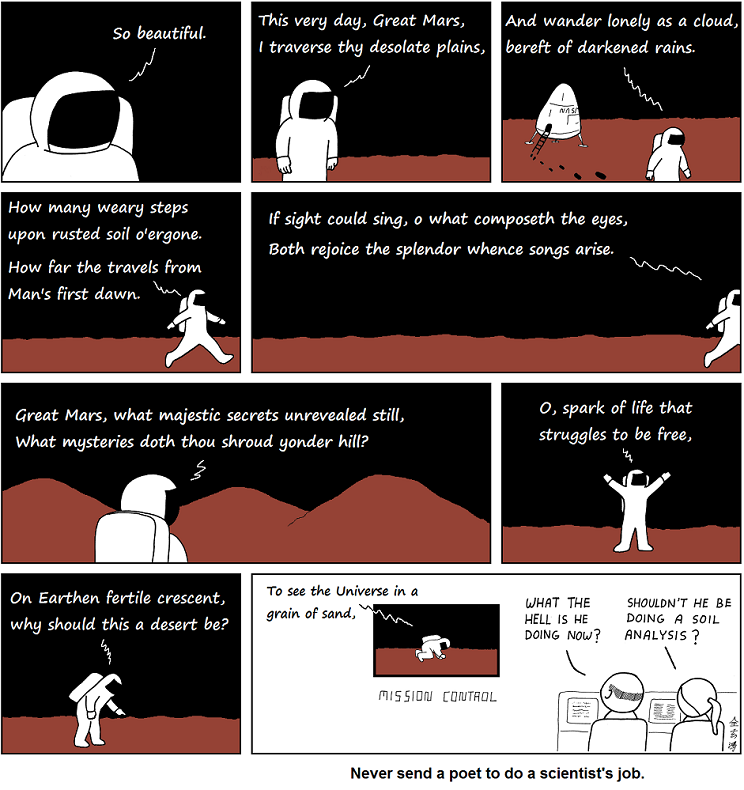__________
This reminds me of that idiot, Walt Whitman, who thought his appreciation of the stars was so superior to the learn’d astronomer’s. The guy needed a pie in the face.
But here’s the question: is good poetry (not AG’s) as enlightening, meaningful, or interesting as a walk on Mars — or any kind of thing that you see and that no one’s ever seen before? Maybe the effects are similar?
_________

This reminds me very neatly of the character Bernard – a literary professor – in Tom Stoppard’s Arcadia:
‘But don’t confuse progress with perfectibility. A great poet is always timely. A great philosopher is an urgent need. There’s no rush for Isaac Newton. We were quite happy with Aristotle’s cosmos. Personally, I preferred it. Fifty-five crystal spheres geared to God’s crankshaft is my idea of a satisfying universe. I can’t think of anything more trivial than the speed of light. Quarks, quasars – big bangs, black holes – who gives a shit? How did you people con us out of all that status? All that money?….. I can expand my universe without you: “She walks into beauty, like the night of cloudless climes and starry skies, and all that’s best of dark and bright meet in her aspect and her eyes.”’
I particularly like the link at the bottom of the Whitman poem page which says ‘report a problem with this poem’.
QoB, Stoppard made the case better and more convincingly than old Walt, didn’t he. I think I disagree still.
Tim, you’re a balm to a sore heart, a sight for sore eyes, a healing for the weary soul. No, I hadn’t seen the link and it makes me very happy.
Go on then. Dare you!
You’ve never sat through a lecture in which the speaker buried his excitement, her wonder at the beauty of the world in a pile of facts, figures, and formulae?
Tim: Never ever take dares.
Ed: Well yes. I certainly have. Though I’m guessing that Walt felt and understood a nano-fraction of the wonder and beauty that the boring speaker did. But your point is that the speaker didn’t communicate the wonder and beauty, and Walt at least tried to. If the speaker’s audience was other scientists, then the speaker wins. If the speaker’s audience was the rest of us, then Walt wins. How’s that?
But isn’t the speaker’s audience always the “rest of us.” If it isn’t, all of us lose.
Walt Whitman was simply expressing the understandable opinion that gazing at the firmament is a far more inspiring activity than sitting in a conference room.
I totally agree. Science should be presented in a far more attractive way to the public, closer to what it studies, i.e. nature.
After all, making the poetry of science evident to people is exactly the job of science writers, and Abstruse Goose by calling Whitman an “idiot” (really? come on!) was kind of demeaning her own category.